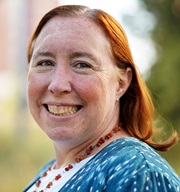Kathryn Rhine, PhD, MA
Associate Professor
Director of the Arts & Humanities in Healthcare Program
 email: Kathryn.Rhine@cuanschutz.edu
email: Kathryn.Rhine@cuanschutz.edu
phone: (401) 688-6565
office: Fulginiti Rm. 206
wellbeing and a sense of hope for the future.
Kathryn Rhine comes to the Center for Bioethics and Humanities from the University of Kansas, where she was an associate professor of African & African-American Studies and Geography & Atmospheric Science. She earned her Ph.D. in Anthropology from Brown University in 2010, where she received a unique education with affiliations in both the Population Studies & Training Center and the Cogut Center for the Humanities. These ties cemented her interests in humanistic approaches to medicine and population health. Over the past several years, Rhine won close to $700,000 in institutional and individual grant funding to initiate several health humanities projects at the University of Kansas. Crosscutting research, curriculum development, and the public humanities, these awards have come from the Mellon Foundation, the Consortium for Humanities Centers and Institutes (CHCI) and the National Endowment for the Humanities (NEH), among others.